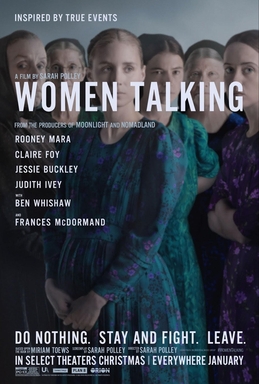Written and directed by Sarah Polley from a novel by Miriam Towles (that was horrifyingly inspired by real-life events in a Mennonite colony in Bolivia), Women Talking teases out its story in a beguiling fashion. We know that a group of women in a religious colony have discovered that the men and boys of the colony have been raping them at night. It is a horrific revelation and the police are called. The men are currently all in town, some having been arrested, others trying to post bail, and the women have gathered to take a vote - will they stay and forgive the men, stay and fight the men, or leave? When the vote shows a tie for the latter two options, a select group of women are appointed to sit together and talk through the final decision. And for the ensuing hour and a half we watch these women talk and deliberate about the horrors they have experienced, the dreams they still miraculously harbor, and their hopes and fears for the future. In flashbacks we start to piece together what happened to each of these women, what has been happening in this colony, and we start to get a sense of time and place, with increasingly startling and horrifying revelations.
Every actor is a marvel and each character is offering up such a unique and nuanced perspective on what has transpired. There's Salome (Claire Foy) who is roiling with rage and wants to stay and fight these men who have abused her and her children for so long. There's her pregnant sister, Ona (Rooney Mara), who is radiantly calm and intelligent and soft-spoken, and senses that leaving is the only true option that will give them their freedom. There's Mariche (Jessie Buckley), who cannot fathom leaving her life behind and thinks everyone needs to lean into their faith in God and forgive these men so the colony can move past this reckoning. And there are the older women, Agata and Greta (Judith Ivey and Sheila McCarthy), who are realizing they may have stood by while horrible things happened to them, their daughters, and their granddaughters but now is the time they must take a stand.
The way that these women talk is absolutely wondrous. The conversations ebb and flow, they have bitter disputes but always come back to resolving their differences with words. They persuade, cajole, yell, cry, and startlingly, laugh. The laughter is the most wondrous piece of it all - how these women can find things to laugh about despite all this horror. There is one man in their midst, August (Ben Whishaw) who is the schoolmaster that the women have recruited to take minutes of their meetings and write up lists of Pros and Cons as none of them have been educated and know how to read and write. He and his questioning mother were excommunicated from the colony but he returned to be of service as a schoolteacher and now finds himself in this position or service to these defiant and brilliant women. It's a poignant reminder of how feminism is always in need of male allies and here August demonstrates what a difference it makes when you are a man who simply listens while women talk.
The film is also a work of art. I was enraptured by the dialogue but may need to watch it again to fully appreciate Luc Montpellier's cinematography as the camera keeps narrowing and widening its focus at different beats and how the scenes can be so bleak and gray when depicting certain horrors but then get saturated with more color as these women start to take a hold of their destiny. The score by Hildur Guonadottir is magnificent, perfectly capturing the somber and serious mood but bringing in the right amount of uplift and optimism to indicate the path forward. Guonadottir won an Oscar for her score for Joker, a film that I hated for its intensely male filmmaking, so I am pleased that perhaps now she will be recognized for her contribution to such a deeply feminist and female movie. I also got the novel from the library and devoured it in one afternoon, and Polley's script is a masterful adaptation - while the book is fantastic, Polley has played with the narrative structure in fantastic ways to make it a truly compelling cinematic experience. This is the exactly the kind of script a Best Adapted Screenplay Oscar should be rewarding, hint, hint.
Women Talking feels like a long therapy session about the patriarchy. It's a reminder that one of the most effective ways to process trauma, whether individual or collective, is to actually talk about it. These women have spent their lives in silence, never talking about their bodies, never discussing the fact that they would wake up in the morning battered and bruised and suddenly pregnant. But now, they are talking. And there is a beautiful power in that.

No comments:
Post a Comment